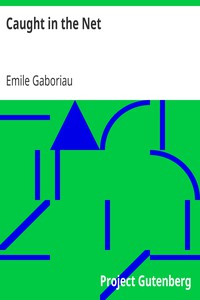The Champdoce Mystery, Emile Gaboriau [ebooks that read to you .TXT] 📗

- Author: Emile Gaboriau
Book online «The Champdoce Mystery, Emile Gaboriau [ebooks that read to you .TXT] 📗». Author Emile Gaboriau
When he reached Bevron, he saw Daumon talking earnestly with Francoise, the daughter of the Widow Rouleau. M. de Puymandour bowed graciously, and stopped to talk with the man, for he was just now seeking for popularity, as he was a candidate, and the elections would shortly take place; and, besides, he never failed to talk to persons who exercised any degree of influence, and he knew that Daumon was a most useful man in electioneering.
“Good morning, Counsellor,” said he gayly. “What is the news to-day?”
Daumon bowed profoundly.
“Bad news, Count,” answered he. “I hear that the Duke de Champdoce is seriously indisposed.”
“The Duke ill—impossible!”
“This girl has just given me the information. Tell us all about it, Francoise.”
“I heard to-day at the Chateau that the doctors had quite given him over.”
“But what is the matter with him?”
“I did not hear.”
M. de Puymandour stood perfectly aghast.
“It is always the way in this world,” Daumon philosophically said. “In the midst of life we are in death!”
“Good morning, Counsellor,” said De Puymandour; “I must try and find out something more about this.”
Breathless, and with his mind filled with anxiety, he hurried on.
All the servants and laborers on the Champdoce estate were gathered together in a group, talking eagerly to each other, and as soon as M. de Puymandour appeared, one of the servants, disengaging himself from his fellows, came towards him. This was the Duke’s old, trustworthy servant.
“Well?” exclaimed M. de Puymandour.
“Oh, sir,” cried the old man, “this is too horrible; my poor master will certainly die.”
“But I do not know what is the matter with him; no one has told me anything, in fact.”
“It was terribly sudden,” answered the man. “It was about this time the day before yesterday that the Duke was alone with M. Norbert in the dining-room. All at once we heard a great outcry. We ran in and saw my poor master lying senseless on the ground, his face purple and distorted.”
“He must have had a fit of apoplexy.”
“Not exactly; the doctor called it a rush of blood to the brain; at least, I think that is what he said, and he added that the reason he did not die on the spot was because in falling he had cut open his head against the oaken sideboard, and the wound bled profusely. We carried him up to his bed; he showed no signs of life, and now——”
“Well, how is he now?”
“No one dare give an opinion; my poor master is quite unconscious, and should he recover—and I do not think for a moment that he will—the doctor says his mind will have entirely gone.”
“Horrible! Too horrible! And a man of such intellectual power, too. I shall not ask you to let me look at him, for I could do no good, and the sight would upset me. But can I not see M. Norbert?”
“Pray, do not attempt to do so, sir.”
“I was his father’s intimate friend, and if the condolences of such a one could assuage the affliction under which—”
“Impossible!” answered the man in a quick, eager manner. “M. Norbert was with his father at the time of his seizure, and has given strict orders that he is not to be disturbed on any account; but I must go to him at once, for we are expecting the physicians who are coming from Poitiers.”
“Very well, then I will go now, but to-night I will send up one of my people for news.”
With these words, M. de Puymandour walked slowly away, absorbed in thought. The manner and expression of the servant had struck him as extremely strange. He noted the fact that Norbert was alone with his father at the time of the seizure, and, recalling to mind the opposition he had met with from his daughter, he began to imagine that the Duke had found his son rebellious, and that the apoplectic fit had been brought on by a sudden access of passion. Interest and ambition working together brought him singularly near the truth.
“If the Duke dies, or becomes a maniac,” thought he to himself, “the end as regards us will be the same for Norbert will break off the match to a certainty.”
He felt that such a proceeding would cause him to be more jeered at and ridiculed than ever, and that the only path of escape left open to him was to marry his daughter to the Marquis de Croisenois, which was a most desirable alliance, in spite of all he had said against it. A voice close to his ear aroused him from his reflections: it was that of Daumon, who had come up unperceived.
“Was the girl’s information correct, Count?” asked he. “How are the Duke and M. Norbert, for of course you have seen them both?”
“M. Norbert is too much agitated by the sad event to see any one.”
“Of course that was to be looked for,” returned the wily Counsellor; “for the seizure was terribly sudden.”
M. de Puymandour was too much occupied with his own thoughts to spare much pity for Norbert. He would have given a great deal to have known what the young man was doing, and especially what he was thinking of at the present moment.
The poor lad was standing by the bedside of his dying father, watching eagerly for some indication, however slight, of returning life or reason. The hours of horror and self-reproach had entirely changed his feelings and ideas; for it was only at the instant when he saw his father raise the poisoned wine to his lips that he saw his crime in all its hideous enormity. His soul rose up in rebellion against his crime, and the words, “Parricide! murderer!” seemed to ring in his ears like a trumpet call. When his father fell to the ground, his instinct made him shout for aid; but an instant afterwards terror took possession of him, and, rushing from the house, he sought the open country, as though striving to escape from himself.
Jean, the old servant, who had noticed Norbert’s strange look, was seized with a terrible fear. Trusted as he was by both the Duke and his son, he had many means of knowing all that was going on in the household, and was no stranger to the differences that had arisen recently between father and son. He knew how violent the tempers of both were, and he also knew that some woman was urging on Norbert to a course of open rebellion. He had seen the cruel blow dealt by the Duke, and had wondered





Comments (0)